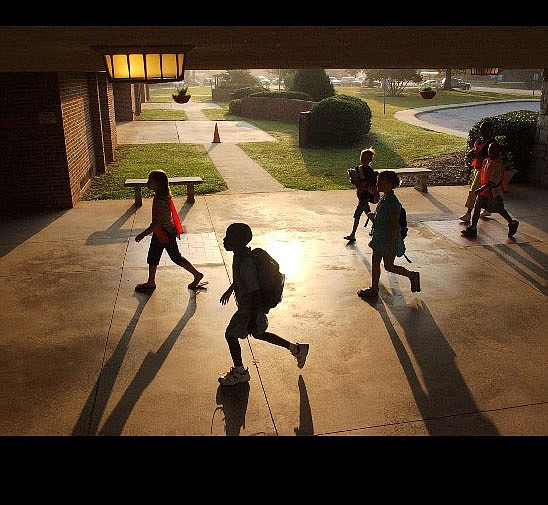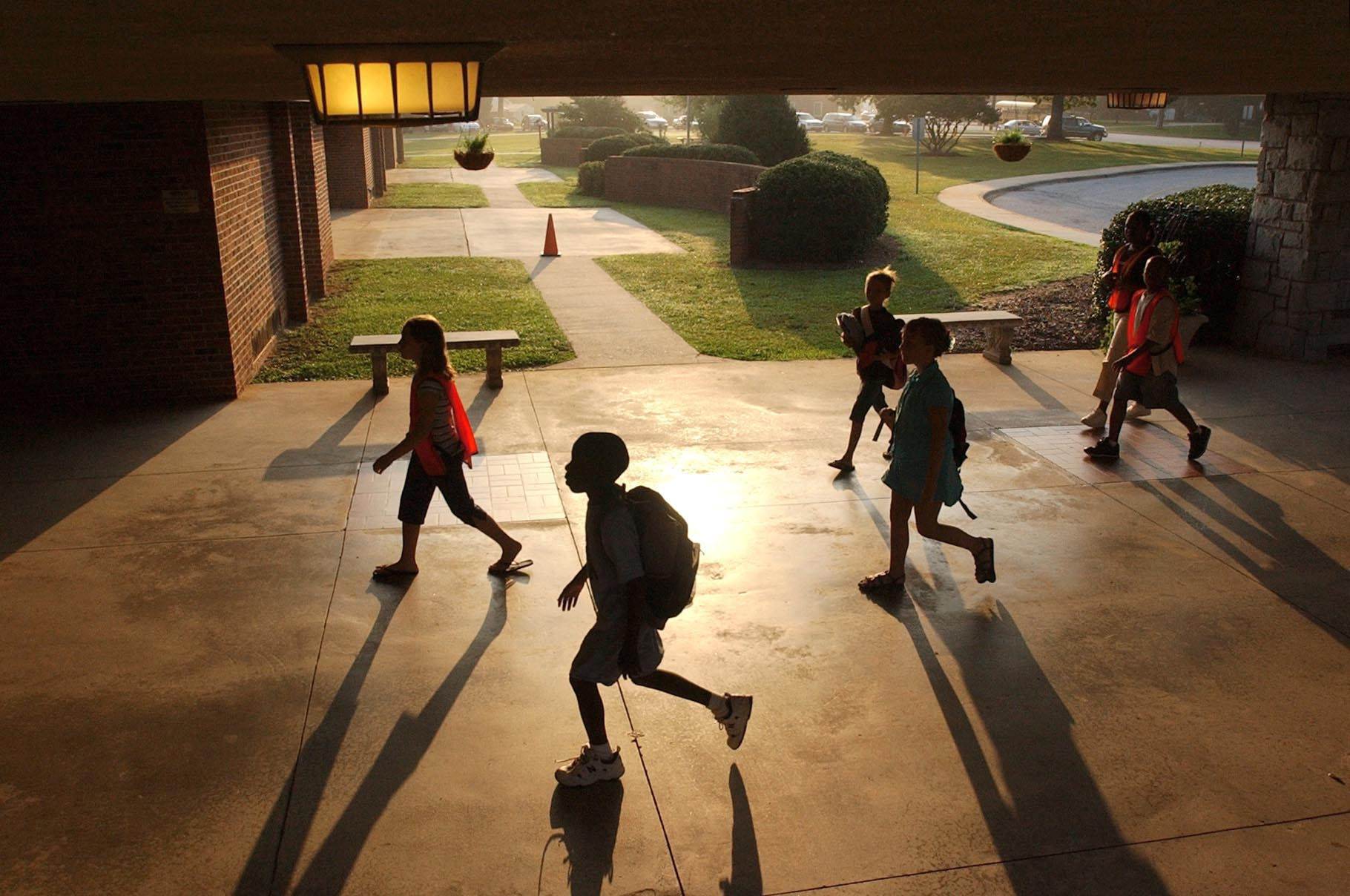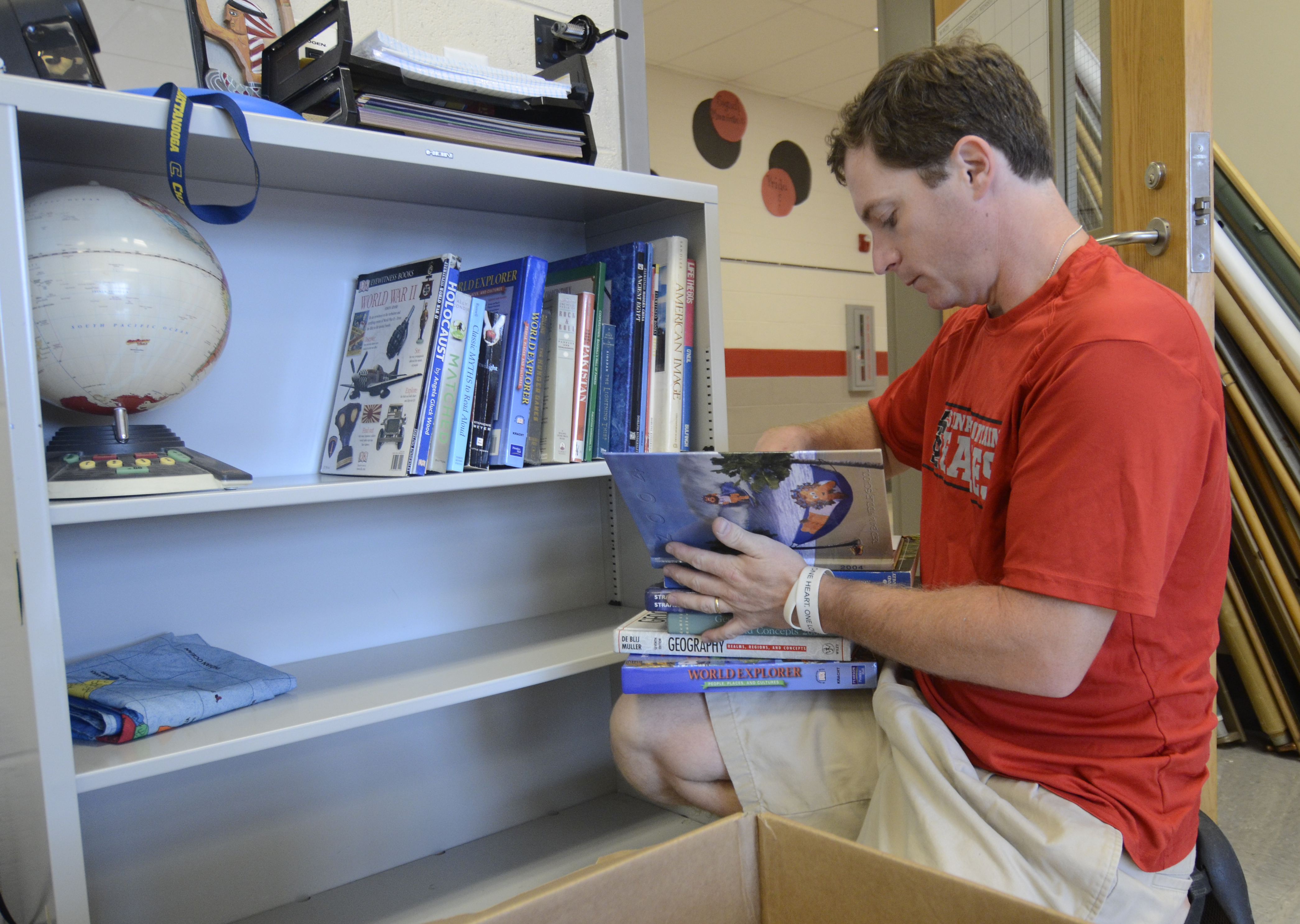'Hey, new kid!' Changing schools can jangle the nerves
Sunday, August 4, 2013
Teachers AnxietyIt's not just students who experience some anxiety when switching schools. Teacher Linda Cagle, of Chattanooga, is transferring to North Whitfield Middle School from Beaverdale Elementary School, both in Dalton, Ga."I wanted to be at this school because I would know some of the students since Beaverdale students feed into this school," Cagle says. "I am excited about this change, but I am a little nervous about it also."However, I know that my former students who will be attending this school will take care of me. I love my kids and look forward to building new relationships with them and growing with them."New schools• In Hamilton County, new campuses for Red Bank Middle and Ooltewah Elementary schools are set to open. Ooltewah Elementary will have a capacity for up to 1,000 students, making it the district's largest elementary. Also, students from the now-closed Birchwood School will be folded into Ooltewah Elementary, along with the other students in the area.• In Walker County, Ga., Saddle Ridge School, which holds kindergarten through eighth grade, is set for about 700 students, and the 94-acre property located in Rock Spring is large enough for a future high school.Easing the transitionHere are some tips to help students adjust to a new school:• Visit the school, if possible; meet the office staff, principal and teachers.• See if the school has a "welcome packet" for new students.• Encourage the student to become involved in school activities, sports or after-school clubs.• Try to meet other school families.• As a parent, become involved in your child's new school through the PTA or other volunteering opportunities.• Make sure the student understands why he or she is changing schools.• With older students, give them as much "warning" as possible so they can deal with the idea.• Let the student know it's OK to feel anxious, scared or angry during the change.• Listen to the student's worries.• Accentuate the positives of the change.• Make sure the student is on a regular bedtime schedule.• Make sure the student has all the correct supplies for the first day of school.Source: Center for School Mental Health at the University of Maryland School of Medicine
When he was growing up, Dan Summerlin attended six schools in six states before he hit 11th grade. With a father in the military, such moves were common, but hardly welcome. Especially the one that moved him from Alpharetta, Ga., to Chattanooga when he was 16.
"I had a great group of friends, a girlfriend and was very established in my school life," says Summerlin. "I remember it was rough starting all over again. I was sad to lose touch with my friends, school, status, etc. I was angry and bitter about it."
That bitterness boiled over a few weeks after school started that year.
"I got into a fight in high school with some guy I had never met," he recalls. "Our school had gathered for an assembly and I was sitting by myself because I really did not know anyone yet. I'm sure I stood out to this guy who was sitting with his friends and who decided to mess with me. He threw gum in my hair and then poured perfume down my back. I guess I was so angry from the move, the change, that it all came out on this guy and I just started punching him. Not a good time."
As school starts back Thursday in Tennessee - schools in Alabama go back in mid-August while Georgia schools wait until the end of August - thousands of students from elementary, middle and high school will be walking through the doors of a new school for the first time. Some have moved into a new school district over the summer; some are youngsters entering kindergarten for the first time; some are simply moving up, leaving the long-familiar safety of their elementary or middle schools and heading to the next level, to schools filled with unfamiliar students from other elementary and middle schools - not to mention the new teachers, administrators and buildings.
Last year, more than 1,300 students transferred into Catoosa County public schools, says Marissa Brower, communications specialist for the system. The students transferred from another Georgia public school system (617), from another state or country (600), from private schools (43) and home schools (53). Additionally, 2,710 students transferred inside the Catoosa system, either going from a pre-school to kindergarten, elementary to middle, or middle to high school, she says.
In Hamilton County and Walker County in Georgia, some students are being funneled into newly built schools that merge students from smaller, closed or outdated schools into a bigger set of buildings. Exact figures are not available from those districts on the number of transferring or new students expected this year, but the new Ooltewah Elementary School alone is absorbing about 125 students from Birchwood School in northern Hamilton County, which closed due to decreasing enrollment. That's more than 100 students heading into a totally new world - one that includes about 675 student faces that will be new to the Birchwood students, too.
But educators and adults who remember being that "new kid in school" say there are steps that can be taken to make the transition easier. One of the most important is to get involved in clubs, sports or other extra-curricular activities that will quickly help them meet new friends.
"The kids that I see handle the transition into a new school environment best are those who become involved immediately," says Scottie Summerlin, Dan Summerlin's wife, who also attended six schools in six states before graduating from high school. "Encourage your children to get involved quickly with extracurricular activities to help them meet more people. Encourage your children to be outgoing and to not be afraid to 'ask first' for play dates to extend invitations to do things with new friends."
Participation in school-based activities and groups "can provide students with a small group environment in which the kids have a less threatening, less intimidating, way to meet and befriend other kids with similar interests," says Summerlin, whose father was a minister and moved his family each time he was assigned to a different church.
Girls Preparatory School teacher Annie Loveless agrees.
"The kids I see handle the transition into a new school environment best are those that become involved immediately - joining a sports team, the orchestra, a club or activity," Loveless says. "Even a school-wide advisory program can provide students with a small group environment in which the kids have a less threatening, less intimidating way to meet and befriend other kids with similar interests, as well as an opportunity to become immersed in the life and community of the school from the start."
Summerlin now works in social media for the Public Education Foundation in Hamilton County and is the mother of 9-year-old twin boys who've lived here all their lives and always attended the same school [Nolan Elementary]. Though the Summerlins say moving around during their childhood wasn't all bad, they don't want their boys to go through the stress.
"When we started seriously dating and were talking about marriage and children, we both wanted our kids to grow up in one community for kindergarten through 12th grades," Scottie Summerlin says. "That is what we are doing and we plan to continue."
Tough transition
Despite the well-intended efforts of parents and teachers, some youngsters will have a difficult time making the necessary adjustments. Signal Mountain Middle School geography teacher Bo Chamberlain, who has taught middle school for 11 years, says "blending in" is a challenge from some students.
"The kids have been taken out of their social group, support networks and sometimes transplanted into completely different school cultures," Chamberlain says. "It is often most difficult for students who switch schools in the middle of the year because their families moved school zones. They come into an environment that may seem intimidating and confusing. They have to get to know new peers, teachers and learn from a different point in the curriculum at the same time."
And problems can arise when children try too hard to fit in, he says.
"Often they are so busy trying to fit in with the other kids that they don't make the best friend choices," he says. "Then, because they are too busy with the 'new' friends, their school work suffers. I cannot tell you how many times you hear from parents of transfers, 'They were getting good grades and never got in trouble in their old school.'"
The situation can become even more serious when some of the "new" students, especially ones who are too shy to reach out for help, end up becoming the target of bullies, Chamberlain says.
Takes a village
Parents play an important role in helping their children adjust to a new surroundings, Summerlin says, and should take the initiative before the school year begins by hosting parties or events in the home, in the community or in the neighborhood, inviting other students and their parents.
After that, parents should get involved in their children's school groups and neighborhood associations "so you can meet parents of children in your area."
If your child is struggling socially or academically after the new school year begins, ask a school guidance counselor or teacher for assistance, Summerlin says. "They can help your child find a buddy with similar interests to help ease the transition."
Retired elementary school teacher Cynthia Zegarra, of Rock Spring, Ga., says acclimating students to new schools takes a combined effort of everyone involved - parents, teachers, administrators and students. And though many might think the youngest children have the biggest problems, that's not always the case, she says.
"Many children entering kindergarten have already experienced separation from their working mother [and/or father] by attending child care or pre-kindergarten," says Zegarra, who taught in parochial schools, including Our Lady of Perpetual Help Catholic School in Chattanooga. "School presents fewer problems for them.
"Children entering a new middle school or junior high can experience a lot of anxiety. They have left their friends and find themselves in a completely new environment," she says. "The children who have been together since kindergarten have well-formed hierarchies. Leaders have become leaders and followers have become followers. A newcomer is an outsider until he/she finds his/her niche in the establishment."
Teachers can help these students by giving them classroom responsibilities and by asking other students to befriend and help them when needed, Zegarra says.
"Depending on their personalities, some children will adapt easily while others may need special counseling."
Graham Shults, of Nolan Elementary School on Signal Mountain, will be attending Center for Creative Arts for the first time. A sixth-grader, she says the hardest part is leaving behind her friends.
"I am really happy that I am going to a new school, but I will miss my friends," but she's making the switch because "CCA encourages the things I love to do."
Dan Summerlin recalls that he adjusted better to new schools when he was younger.
"I think moving at an earlier age is not that hard for most kids," he says. "It can even be exciting, like an adventure - a new house, new bedroom, new school, new friends, new neighborhood."
"I remember a few teachers who went out of their way on my first few days to be kind, which helped ease the angst a new kid would feel entering a class of strangers. But once you get into your teens, it becomes more of an issue to start all over in your peer group."
Scottie Summerlin echoes her husband, saying her hardest move came during her senior year.
"I was 17 years old, and I did not want to leave my friends or all my extra-curricular activities," she says. "My best friend's parents actually offered to let me live with them for my last year of high school, which I really wanted to do, but my parents wanted me to move with them so I could be with them my last year of high school before I went off to college."
Not all bad
While switching schools may be challenging, there can be long-term benefits, she says.
"Moving around a lot as a child definitely taught me how to put myself out there. You have no choice but to learn how to introduce yourself, meet new people, and join activities to make new friends. Those skills helped me in college and in my career.
"When I was a television news anchor/reporter, I moved several times from state to state for different positions. Moving to new television stations and learning a new market was a piece of cake for me because of my background."
The Summerlins say their parents tried to make the transitions easy for their children.
"Now being a parent myself, I know that my parents did many things for me to make the transition easier - researched sports, activities, homes - to help plug us in," Dan Summerlin says. "Heck, nobody truly wants to move, not even the parents. But jobs, interests, promotions take you places and you make decisions based upon what's best for your family. But as a kid, you don't realize what is going on and you feel that things are being done to you.
"I believe we are all a product of our experiences and my childhood helped shape me into who I am today. I'm grateful now. I wish I could have known that then. I would not have given my parents such grief over the last move."
For parents of children age 12 and younger, Dan Summerlin says "make the move like an adventure. Sure, they will be sad about leaving their friends, but they will start to be excited about a city, new house, their room, their school."
For teens, it's probably always going to be a hard sell, he says.
"They will have more to grieve," Summerlin says. "Have adult discussions with them about the move. Talk with them about why the move is good for the family so they have an understanding of the reason. They will not be happy about it, but at least they will understand why and that everyone is making a sacrifice - not just the teen. Give them room to sulk but also stay involved with them."
Contact staff writer Karen Nazor Hill at khill@timesfreepress.com or 423-757-6396.


